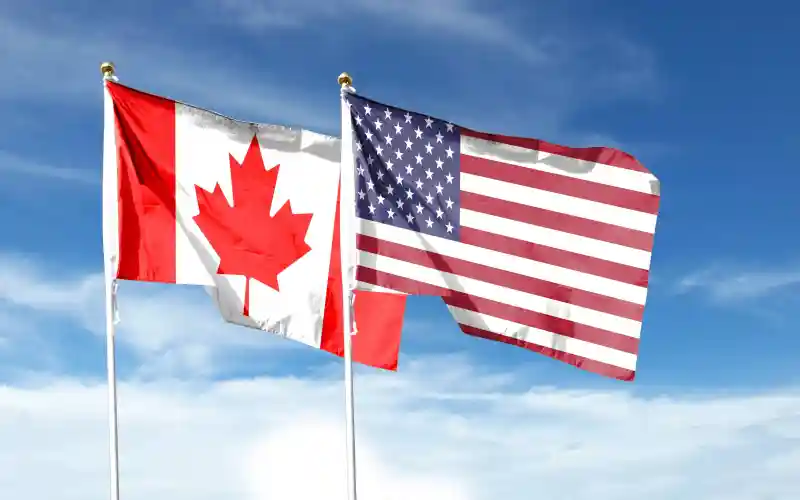Business
Canada Border Agency Reminds Travelers that Bringing Cannabis Across an International Border Is Illegal

With Canada Day and Independence Day just a week away, Canada is making it clear that taking cannabis across the border is not permitted.
The Canada Border Services Agency (CBSA) released a press release on June 26 as a reminder for people traveling for Canada Day (July 1) or the U.S.’s Independence Day (July 4)—no cannabis across the border.
For those who plan to traverse the border between the U.S. and Canada, CBSA recommends tips such as planning ahead for border wait times, saving time with an Advance Declaration, and having travel documents handy. The topic of cannabis was also shared in this list as well.
The section entitled “Cannabis: Don’t bring it in. Don’t take it out.” refers to the restrictions of cannabis being brought across the border. “Bringing cannabis across the border in any form, including oils containing tetrahydrocannabinol (THC) or cannabidiol (CBD), without a permit or exemption authorized by Health Canada is a serious criminal offence subject to arrest and prosecution, despite the legalization of cannabis in Canada. A medical prescription from a doctor does not count as Health Canada authorization.”
In other words, no amount of cannabis for recreational or medical use is allowed. This isn’t a new policy, as Canada has prohibited the transport of cannabis across the country’s border for years.
“If you are entering Canada from another country, remember: if you have cannabis with you in any form, you must declare it to the Canada Border Services Agency. Not declaring cannabis in your possession at the Canadian border could also lead to arrest and prosecution,” CBSA explains on its website. “If you are leaving Canada, remember: you may not take cannabis out of the country either. You may be subject to criminal charges if you attempt to travel to other countries with any amount of cannabis in your possession.”
Technically, Health Canada has the authority to grant exemptions for cannabis import or export, but such circumstances are done for limited purposes including “medical, scientific, or industrial hemp.”
Although the rules are clear, many people still get held up at the border due to cannabis. One of the most recent examples of this was last week when musician Afroman was stopped at the border. According to TMZ, Afroman had given away all of his excess cannabis product at the hotel he had stayed at but forgot to get rid of a bottle of cannabis lotion and infused gummies. As a result, he was detained for five hours and fined $500 for the lotion and his DJ was fined $500 for the gummies.
Also earlier this month, an American driver who had nearly 400 pounds of cannabis in his car, along with $602,985 in cash, claimed that his GPS accidentally directed him through the Rainbow Bridge border crossing in Niagara Falls, Canada. “The safety and security of Canadians is our government’s top priority,” said Canadian Member of Parliament and Minister of Public Safety, Marco Mendicino. “This seizure demonstrates the crucial role that the CBSA and the RCMP play in stopping illicit contraband from entering our communities. Outstanding work by both agencies.” Coincidentally, 400 pounds of cannabis was also caught and seized at the Ohio/Canada border, which was intercepted by U.S. Customs and Border Protection in September 2022.
Even back in March 2023, Rihanna’s tour buses (a total of 10 vehicles) were stopped as they were making their way from Canada to Detroit, Michigan. U.S. Border Patrol officers detected a strong cannabis smell, and found a small amount of cannabis in the possession of one individual, who was issued a “civil penalty.”
In September 2017, musician Todd Rundgren was arrested while traveling from Canada to Fargo, North Dakota. Although drug-sniffing dogs didn’t catch the scent of cannabis, border patrol officers found various joints, glass containers containing THC, and two vapes.
Just a few months later in November 2017, musician Melissa Etheridge also plead guilty to cannabis possession as she crossed the border from Canada to North Dakota. She was fined $750 and served a one-month period of “unsupervised probation.”
Business
New Mexico cannabis operator fined, loses license for alleged BioTrack fraud

New Mexico regulators fined a cannabis operator nearly $300,000 and revoked its license after the company allegedly created fake reports in the state’s traceability software.
The New Mexico Cannabis Control Division (CCD) accused marijuana manufacturer and retailer Golden Roots of 11 violations, according to Albuquerque Business First.
Golden Roots operates the The Cannabis Revolution Dispensary.
The majority of the violations are related to the Albuquerque company’s improper use of BioTrack, which has been New Mexico’s track-and-trace vendor since 2015.
The CCD alleges Golden Roots reported marijuana production only two months after it had received its vertically integrated license, according to Albuquerque Business First.
Because cannabis takes longer than two months to be cultivated, the CCD was suspicious of the report.
After inspecting the company’s premises, the CCD alleged Golden Roots reported cultivation, transportation and sales in BioTrack but wasn’t able to provide officers who inspected the site evidence that the operator was cultivating cannabis.
In April, the CCD revoked Golden Roots’ license and issued a $10,000 fine, according to the news outlet.
The company requested a hearing, which the regulator scheduled for Sept. 1.
At the hearing, the CCD testified that the company’s dried-cannabis weights in BioTrack were suspicious because they didn’t seem to accurately reflect how much weight marijuana loses as it dries.
Company employees also poorly accounted for why they were making adjustments in the system of up to 24 pounds of cannabis, making comments such as “bad” or “mistake” in the software, Albuquerque Business First reported.
Golden Roots was fined $298,972.05 – the amount regulators allege the company made selling products that weren’t properly accounted for in BioTrack.
The CCD has been cracking down on cannabis operators accused of selling products procured from out-of-state or not grown legally:
- Regulators alleged in August that Albuquerque dispensary Sawmill Sweet Leaf sold out-of-state products and didn’t have a license for extraction.
- Paradise Exotics Distro lost its license in July after regulators alleged the company sold products made in California.
Golden Roots was the first alleged rulebreaker in New Mexico to be asked to pay a large fine.
Source: https://mjbizdaily.com/new-mexico-cannabis-operator-fined-loses-license-for-alleged-biotrack-fraud/
Business
Marijuana companies suing US attorney general in federal prohibition challenge

Four marijuana companies, including a multistate operator, have filed a lawsuit against U.S. Attorney General Merrick Garland in which they allege the federal MJ prohibition under the Controlled Substances Act is no longer constitutional.
According to the complaint, filed Thursday in U.S. District Court in Massachusetts, retailer Canna Provisions, Treevit delivery service CEO Gyasi Sellers, cultivator Wiseacre Farm and MSO Verano Holdings Corp. are all harmed by “the federal government’s unconstitutional ban on cultivating, manufacturing, distributing, or possessing intrastate marijuana.”
Verano is headquartered in Chicago but has operations in Massachusetts; the other three operators are based in Massachusetts.
The lawsuit seeks a ruling that the “Controlled Substances Act is unconstitutional as applied to the intrastate cultivation, manufacture, possession, and distribution of marijuana pursuant to state law.”
The companies want the case to go before the U.S. Supreme Court.
They hired prominent law firm Boies Schiller Flexner to represent them.
The New York-based firm’s principal is David Boies, whose former clients include Microsoft, former presidential candidate Al Gore and Elizabeth Holmes’ disgraced startup Theranos.
Similar challenges to the federal Controlled Substances Act (CSA) have failed.
One such challenge led to a landmark Supreme Court decision in 2005.
In Gonzalez vs. Raich, the highest court in the United States ruled in a 6-3 decision that the commerce clause of the U.S. Constitution gave Congress the power to outlaw marijuana federally, even though state laws allow the cultivation and sale of cannabis.
In the 18 years since that ruling, 23 states and the District of Columbia have legalized adult-use marijuana and the federal government has allowed a multibillion-dollar cannabis industry to thrive.
Since both Congress and the U.S. Department of Justice, currently headed by Garland, have declined to intervene in state-licensed marijuana markets, the key facts that led to the Supreme Court’s 2005 ruling “no longer apply,” Boies said in a statement Thursday.
“The Supreme Court has since made clear that the federal government lacks the authority to regulate purely intrastate commerce,” Boies said.
“Moreover, the facts on which those precedents are based are no longer true.”
Verano President Darren Weiss said in a statement the company is “prepared to bring this case all the way to the Supreme Court in order to align federal law with how Congress has acted for years.”
While the Biden administration’s push to reschedule marijuana would help solve marijuana operators’ federal tax woes, neither rescheduling nor modest Congressional reforms such as the SAFER Banking Act “solve the fundamental issue,” Weiss added.
“The application of the CSA to lawful state-run cannabis business is an unconstitutional overreach on state sovereignty that has led to decades of harm, failed businesses, lost jobs, and unsafe working conditions.”
Business
Alabama to make another attempt Dec. 1 to award medical cannabis licenses

Alabama regulators are targeting Dec. 1 to award the first batch of medical cannabis business licenses after the agency’s first two attempts were scrapped because of scoring errors and litigation.
The first licenses will be awarded to individual cultivators, delivery providers, processors, dispensaries and state testing labs, according to the Alabama Medical Cannabis Commission (AMCC).
Then, on Dec. 12, the AMCC will award licenses for vertically integrated operations, a designation set primarily for multistate operators.
Licenses are expected to be handed out 28 days after they have been awarded, so MMJ production could begin in early January, according to the Alabama Daily News.
That means MMJ products could be available for patients around early March, an AMCC spokesperson told the media outlet.
Regulators initially awarded 21 business licenses in June, only to void them after applicants alleged inconsistencies with how the applications were scored.
Then, in August, the state awarded 24 different licenses – 19 went to June recipients – only to reverse themselves again and scratch those licenses after spurned applicants filed lawsuits.
A state judge dismissed a lawsuit filed by Chicago-based MSO Verano Holdings Corp., but another lawsuit is pending.
Source: https://mjbizdaily.com/alabama-plans-to-award-medical-cannabis-licenses-dec-1/
-

 Business2 years ago
Business2 years agoPot Odor Does Not Justify Probable Cause for Vehicle Searches, Minnesota Court Affirms
-

 Business2 years ago
Business2 years agoNew Mexico cannabis operator fined, loses license for alleged BioTrack fraud
-

 Business2 years ago
Business2 years agoAlabama to make another attempt Dec. 1 to award medical cannabis licenses
-

 Business2 years ago
Business2 years agoWashington State Pays Out $9.4 Million in Refunds Relating to Drug Convictions
-

 Business2 years ago
Business2 years agoMarijuana companies suing US attorney general in federal prohibition challenge
-

 Business2 years ago
Business2 years agoLegal Marijuana Handed A Nothing Burger From NY State
-

 Business2 years ago
Business2 years agoCan Cannabis Help Seasonal Depression
-

 Blogs2 years ago
Blogs2 years agoCannabis Art Is Flourishing On Etsy













